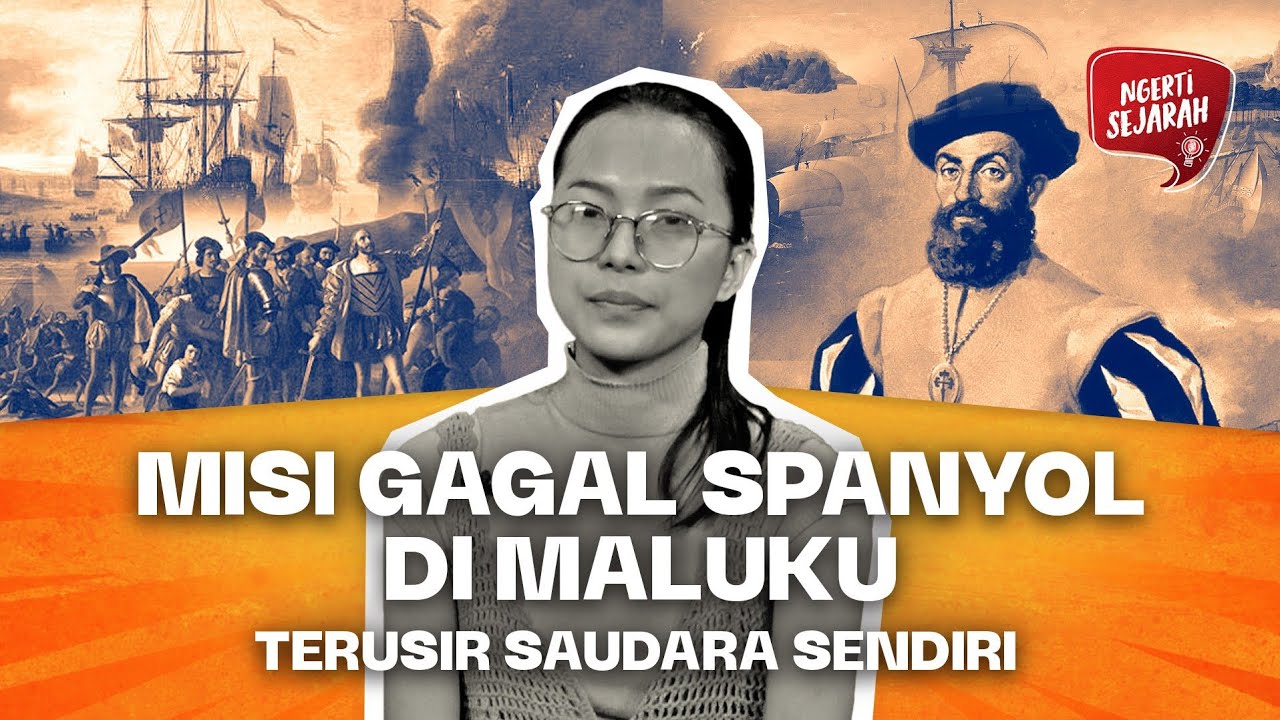Sejarah dan Latar Belakang kedatangan Spanyol ke Indonesia
Summary
TLDRThe video script delves into the historical context of Spanish exploration in the 15th century, driven by the quest for valuable spices and influenced by political shifts such as the fall of Constantinople. It highlights the Tordesillas Agreement of 1494, which divided the world between Spain and Portugal, leading to Christopher Columbus's famed discovery of the Americas. The narrative continues with Spain's arrival in Indonesia, marked by Ferdinand Magellan's expedition and the ensuing conflicts with Portugal over the Moluccas, culminating in the Saragosa Agreement that saw Spain's withdrawal from the region. The script concludes with a mention of Spanish relics in Indonesia, such as Fort Tahula, serving as a testament to their historical presence.
Takeaways
- 🌐 The Tordesillas agreement of 1449 divided the world into two regions, granting Spain the right to explore and control the western routes, including the Americas discovered by Christopher Columbus.
- 🏴☠️ European nations, including Spain, sought new sea voyages from the 15th century to find sources of valuable spices, which were essential commodities in Europe.
- 📜 The historical context of European exploration was also shaped by political events such as the defeat in the Crusades and the fall of Constantinople to the Ottoman Turks, which disrupted traditional trade routes.
- 🛳️ Spain's exploration was driven by the '3G' spirit: the pursuit of gold, power, and the spread of the Gospel through Catholicism.
- 🗺️ The Spanish, led by Fernando de Magellan, arrived in the Philippines in 1521, and after Magellan's death, Sebastian del Cano continued the expedition, eventually reaching Indonesia.
- 🛡️ The arrival of the Spanish in the Maluku Islands was met with opposition from the Portuguese, who had already established a presence there and accused Spain of violating the Tordesillas agreement.
- 🤝 Spain attempted to form alliances, particularly with the Tidore sultanate, to gain an advantage in the spice trade and counter the Portuguese influence.
- 💥 The conflict between Spain and Portugal over the Maluku Islands escalated, leading to battles and a shift in alliances that affected local politics.
- 📝 The Saragosa agreement marked the end of Spanish intervention in Indonesia, with Spain agreeing to leave the Moluccas and focus on the Philippines, while Portugal maintained control over the spice trade.
- 🏰 Despite their limited time in Indonesia, Spain left behind some historical relics, such as Fort Tahula in Tidore, serving as a testament to their presence.
- 📚 The video script provides a detailed account of Spain's arrival and activities in Indonesia, highlighting the complex interplay of exploration, trade, and religious expansion during the Age of Discovery.
Q & A
What was the Tordesillas agreement and how did it divide the world?
-The Tordesillas agreement, signed on June 7, 1494, was a treaty that divided the world into two regions, stretching from the North Pole to the South Pole. It granted Spain the right to control the western side of the line, while Portugal was given control over the eastern side.
Who is Christopher Columbus and what is his significance in the script?
-Christopher Columbus was an Italian explorer who is widely recognized for his discovery of the Americas. In the script, he is mentioned as one of the most famous figures in Spanish exploration, symbolizing the beginning of European interest in the New World.
Why were spices so valuable to Europeans in the 15th century?
-Spices were highly valuable to Europeans in the 15th century due to their use as ingredients in food mixtures and as preservatives, especially during the cold winter season. They were considered expensive commodities.
What were the two important political events that spurred European explorations?
-The two significant political events were the defeat of the European Catholic kingdoms in the crusade and the fall of Constantinople to the Ottoman Turks. These events disrupted traditional trade routes and economic conditions, prompting European nations to seek new routes.
Why did European nations mobilize their sailors for oceanic voyages?
-European nations mobilized their sailors to sail across the ocean in search of new trade routes due to the deterioration of their economic conditions and the prohibition of European traders from entering Ottoman territories by Sultan Mahmud II.
Who was Fernando de Magallanes, and what was his expedition's goal?
-Fernando de Magallanes, also known as Magellan, was a Portuguese explorer who led an expedition for Spain. His goal was to find a westward route to the Spice Islands, which eventually led to the first circumnavigation of the Earth.
What was the significance of the Spanish arrival in the Philippines in April 1521?
-The Spanish arrival in the Philippines in April 1521 marked the first European contact with the islands. However, Magellan was killed there, and the expedition was continued by Captain Sebastian del Cano.
What was the purpose of the Spanish nation's arrival in the Maluku Islands?
-The Spanish arrived in the Maluku Islands with the 3G spirit: seeking gold (wealth from the spice trade), power, and the Gospel (spreading Catholicism).
How did the arrival of the Spaniards in Maluku affect the Portuguese?
-The arrival of the Spaniards in Maluku was opposed by the Portuguese, who had already established a presence there. This led to accusations of Spain violating the Tordesillas agreement and increased tensions between the two powers.
What was the outcome of the conflict between Spain and Portugal in the Maluku Islands?
-The conflict resulted in the Saragosa agreement, where Spain was asked to leave the Maluku Islands and move to the Philippines, while the Portuguese remained in control of the Moluccas without Spanish intervention.
What is the historical legacy of Spain in Indonesia?
-The historical legacy of Spain in Indonesia is marked by the short period of Spanish intervention from 1521 to 1692. Today, one can find relics such as Fort Tahula in the Tidore Islands, serving as a silent witness to Spain's history in Indonesia.
Outlines

This section is available to paid users only. Please upgrade to access this part.
Upgrade NowMindmap

This section is available to paid users only. Please upgrade to access this part.
Upgrade NowKeywords

This section is available to paid users only. Please upgrade to access this part.
Upgrade NowHighlights

This section is available to paid users only. Please upgrade to access this part.
Upgrade NowTranscripts

This section is available to paid users only. Please upgrade to access this part.
Upgrade NowBrowse More Related Video

kolonialisme dan imperialisme bag 1

Sejarah Kedatangan Belanda ke Indonesia Materi Kelas XI

Sejarah kedatangan bangsa spanyol di nusantara

LAHIRNYA KOLONIALISME DAN IMPERIALISME KELAS XI KURIKULUM MERDEKA

MENGAPA BANGSA EROPA DULU MEMBURU REMPAH-REMPAH?

Kedatangan Bangsa Spanyol ke Indonesia | HISTORIA.ID
5.0 / 5 (0 votes)